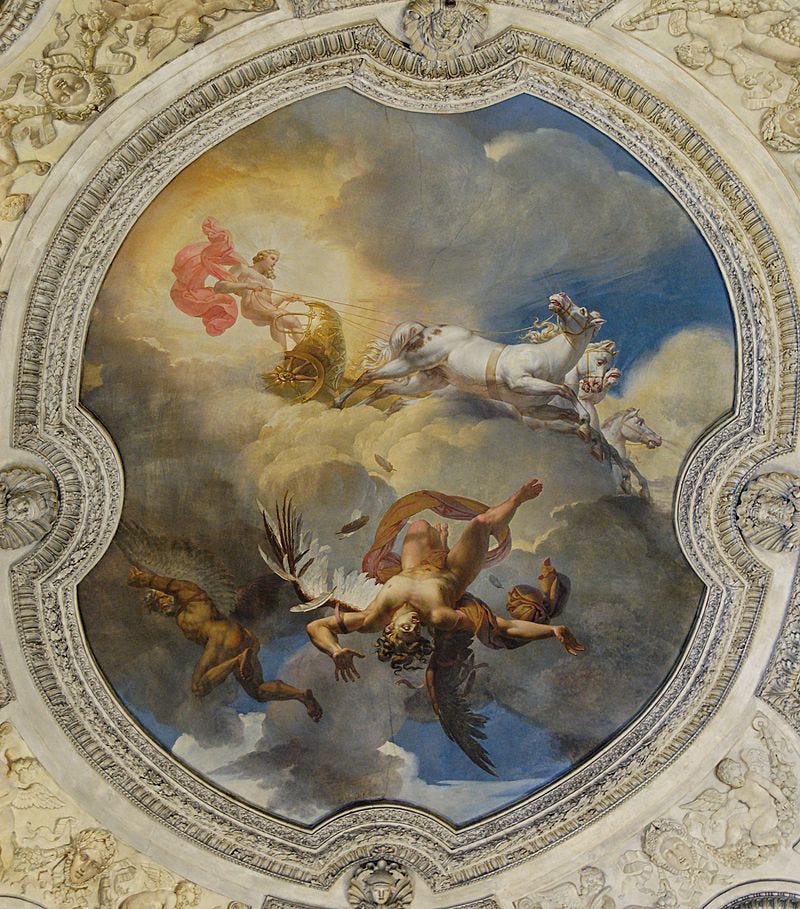Greek Mythology in 7 Stories
What if the stories you heard as myths were actually ancient warnings or coded messages meant to save your soul?
Greek Mythology in 7 Stories
What if the stories you heard as myths were actually ancient warnings, coded messages meant to save your soul?

When I first read the story of Icarus as a child, I thought it was just a tale about flying too high. But as I got older, I saw something darker: the boy didn’t just fall. He burned. His ambition wasn't punished by the gods; it was consumed by the very thing that gave it life. That’s what Greek mythology is. It's not fantasy. It’s memory. It's pain turned into poetry, wisdom disguised as wonder. These aren't just stories. They are maps carved into the imagination of a people trying to survive chaos, fate, and the cruelty of their own gods.
1. Prometheus: The Fire Thief
Prometheus wasn’t a hero. He was a rebel with a cause and his cause was humanity. Before him, we were cold, weak, and silent. No fire. No voice. No tools. The gods wanted it that way. Zeus especially. But Prometheus couldn’t watch us suffer.
He climbed Olympus, stole fire from the hearth of the gods, and brought it down to earth in a fennel stalk. That single act changed everything. Fire gave us warmth, tools, language, and power. We stopped being prey and became creators.
Zeus didn’t take it well. As punishment, Prometheus was chained to a mountain. Every day, an eagle came to tear out his liver. Every night, it grew back. Eternal torment for helping us rise.
But Prometheus never begged. Never repented. His pain became our freedom. And in that agony, the Greeks saw the cost of progress.
To them, Prometheus was more than a character. He was the symbol of defiance, the reminder that knowledge is never free, and every generation must decide what it's willing to pay for truth.
2. Pandora: The First Woman
The gods crafted her as a gift, but also a trap. Pandora wasn’t made of flesh; she was made of vengeance. After Prometheus stole fire, Zeus sent Pandora to his brother, Epimetheus. She came with a jar. Sealed. Mysterious.
Epimetheus ignored his brother’s warnings and welcomed her. Curiosity got the better of Pandora. One day, she opened the jar. Out poured everything the gods had hidden. Sickness, Sorrow, Greed, Death.
But at the very bottom was hope.
The Greeks weren’t naive. They knew life was filled with pain. What they wrestled with was where it came from—and whether it could be undone. Pandora wasn’t just about blame. She was about complexity. The first woman wasn’t evil. She was curious. And that curiosity unleashed the full spectrum of human experience.
Today, her story warns us: knowledge and suffering are twins. But it also reminds us that there’s always hope, even at the bottom of a broken world.
3. Orpheus and Eurydice: Love vs Death
This isn’t a love story. It’s a lesson in timing, loss, and the weight of trust. Orpheus, the greatest musician in myth, lost his wife, Eurydice, to a snakebite. But he didn’t accept it.
He went into the Underworld.
His music was so beautiful, it made Hades weep. It softened Persephone’s heart. No one had ever done that. The gods agreed to release Eurydice—on one condition: Orpheus could not look back at her until they were out.
They climbed. Step by step. Darkness behind. Light ahead. And then—Orpheus looked back.
She vanished. Forever.
The Greeks told this story to show how fragile hope is. One moment of doubt. One glance—and you lose everything. Orpheus reminds us that love is powerful, but not invincible. Sometimes, it dies. And no music, no prayer, can bring it back.
But even so, they sang his name for centuries.
4. Theseus and the Labyrinth: Order vs Chaos
Crete demanded tribute—seven Athenian boys, seven girls—to feed the Minotaur. A monster trapped in a maze. Theseus volunteered to end it.
Inside the labyrinth, he left a thread behind him. A lifeline. At the center, he found the beast—half-man, half-bull—and killed it with a sword given to him by Ariadne, who loved him.
But when he returned, he abandoned her on an island.
The Greeks knew life was a maze. Every path looks the same. Every turn hides danger. Theseus didn't just fight a monster. He confronted what happens when you face chaos alone and when you betray those who help you.
His story is brutal, honest. Heroism isn’t always pure. And victories often leave a trail of guilt.
To the Greeks, the labyrinth wasn’t just a setting. It was a metaphor for life. The thread—our choices. The beast—our shadow. The question—what do we become once we escape?






